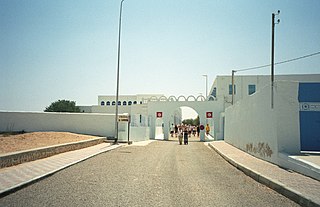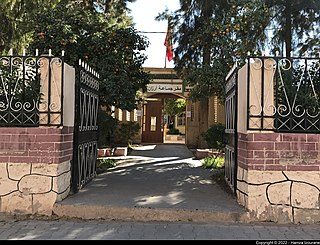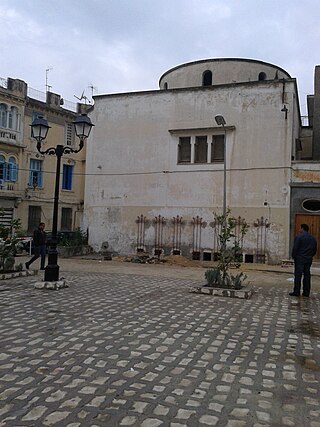
Tunisia, officially the Republic of Tunisia, is the northernmost country in Africa. It is a part of the Maghreb region of North Africa, bordered by Algeria to the west and southwest, Libya to the southeast, and the Mediterranean Sea to the north and east. It features the archaeological sites of Carthage dating back to the 9th century BC, as well as the Great Mosque of Kairouan. Known for its ancient architecture, souks and blue coasts, it covers 163,610 km2 (63,170 sq mi), and has a population of 12.1 million. It contains the eastern end of the Atlas Mountains and the northern reaches of the Sahara desert; much of its remaining territory is arable land. Its 1,300 km (810 mi) of coastline include the African conjunction of the western and eastern parts of the Mediterranean Basin. Tunisia is home to Africa's northernmost point, Cape Angela. Located on the northeastern coast, Tunis is the capital and largest city in the country. Tunisia is named after Tunis.

Tunis is the capital and largest city of Tunisia. The greater metropolitan area of Tunis, often referred to as "Grand Tunis", has about 2,700,000 inhabitants. As of 2020, it is the third-largest city in the Maghreb region and the eleventh-largest in the Arab world.

The Ghriba synagogue bombing was carried out by Niser bin Muhammad Nasr Nawar on the El Ghriba synagogue in Tunisia in 2002.

The ancient El Ghriba Synagogue, also known as the Djerba Synagogue, is located on the Tunisian island of Djerba. It is situated in the Jewish village of Hara Seghira, several kilometres southwest of Houmt El Souk, the main town of Djerba.

The history of the Jews in Tunisia extended nearly two thousand years and goes back to the Punic era. The Jewish community in Tunisia is no doubt older and grew up following successive waves of immigration and proselytism before its development was hampered by anti-Jewish measures in the Byzantine Empire. The community formerly used its own dialect of Arabic. After the Muslim conquest of Tunisia, Tunisian Judaism went through periods of relative freedom or even cultural apogee to times of more marked discrimination. The arrival of Jews expelled from the Iberian peninsula, often through Livorno, greatly altered the country. Its economic, social and cultural situation has improved markedly with the advent of the French protectorate before being compromised during the Second World War, with the occupation of the country by the Axis. The creation of Israel in 1948 provoked a widespread anti-Zionist reaction in the Arab world, to which was added nationalist agitation, nationalization of enterprises, Arabization of education and part of the administration. Jews left Tunisia en masse from the 1950s onwards because of the problems raised and the hostile climate created by the Bizerte crisis in 1961 and the Six-Day War in 1967. The Jewish population of Tunisia, estimated at about 105,000 individuals in 1948, numbered around 1,000 individuals as of 2019. These Jews lived mainly in Tunis, with communities present in Djerba.

Operation "Wooden Leg" was an Israeli airstrike on the Palestine Liberation Organization (PLO) headquarters in Hammam Chott, near Tunis, Tunisia, on October 1, 1985. With a target 1,280 miles (2,060 km) from the operation's starting point, this was the most distant publicly known action undertaken by the Israel Defense Forces since Operation Entebbe in 1976. On 4 October, the airstrike was condemned by the United Nations Security Council.
Of the religions in Tunisia, Islam is the most prevalent. It is estimated that in 2022, approximately 99% of Tunisia's inhabitants identified themselves as Muslims.

On 3 October 1980, a bomb exploded outside the Rue Copernic synagogue in the 16th arrondissement of Paris, France, during Shabbat services. Approximately 320 worshippers were inside the synagogue when the bomb went off outside, killing four people and wounding 46. It was the first deadly attack against Jews in France since the end of the Second World War.

Arazan is a small town and rural commune in Taroudant Province of the Souss-Massa region of Morocco. At the time of the 2014 census, the commune had a total population of 7999 people living in 1422 households.
This is a list of individual incidents and statistical breakdowns of incidents of violence between Israel and Palestinian dissident factions in 2014 as part of the Israeli–Palestinian conflict.
On 24 November 2015, a bus carrying Tunisian presidential guards exploded, killing 12, on a principal road in Tunis, Tunisia. ISIL claimed responsibility for the attack. The bomber, who also died in the attack, was identified as Houssem Abdelli.
The IS insurgency in Tunisia refers to the ongoing militant and terror activity of the Islamic State branch in Tunisia. The activity of the Islamic State (IS) in Tunisia began in June 2015, with the Sousse attacks, though an earlier terror incident in Bardo Museum in March 2015 was claimed by ISIL, while the Tunisian government blamed Okba Ibn Nafaa Brigade for the attack. Following massive border clashes near Ben Guerdane in March 2016, the activity of the IS group was described as an armed insurgency, switching from previous tactics of sporadic suicide attacks to attempts to gain territorial control.

The Or-Thora Synagogue is a synagogue located in the Hara of the city of Tunis.
This article covers attacks and activity of terrorism in Belgium.
Yosef Guez, also known as Youssef Guez and Youssef el Guidj, was a Grand Rabbi of Tunisia. He served in Sousse (1906–1928) then in Tunis (1928–1934) where he served as Grand Rabbi of Tunisia until his death.
In June 1967, an anti-Jewish pogrom took place in the Libyan city of Tripoli.
Since the start of the 2023 Israel–Hamas war on 7 October 2023, numerous attacks took place both internally and internationally as part of, and in response to the conflict. These attacks were mostly antisemitic, anti-Israel, anti-Muslim, or anti-Palestinian, but others have been targeted.
Following the Hamas attack on Israel on 7 October 2023 and the outbreak of the 2023 Israel–Hamas war, there has been a surge of antisemitism around the world. Israeli Immigration Minister Ofir Sofer has stated that Israel is bracing to expect a large wave of Jews migrating to Israel due to the rising antisemitism around the world.

![Funeral of Rabbi Yacob Boccara [he] in 1941. Obseques rabbin Boccara.JPG](http://upload.wikimedia.org/wikipedia/commons/thumb/2/2d/Obs%C3%A8ques_rabbin_Boccara.JPG/220px-Obs%C3%A8ques_rabbin_Boccara.JPG)









